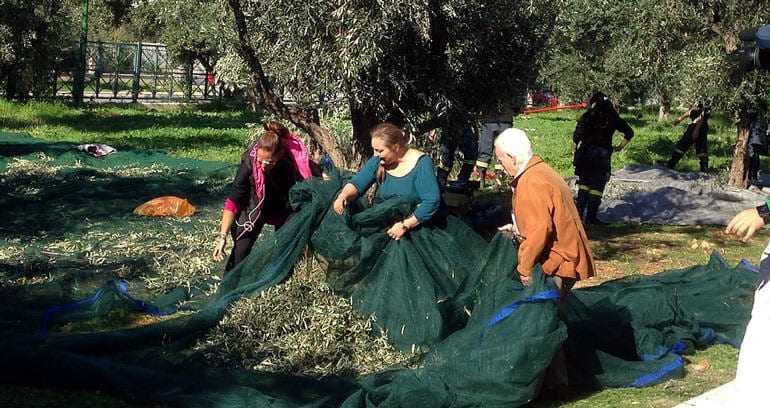On October 26, dozens of volunteers in the Athens suburb of Glyfada began harvesting olives from trees growing on public land in order to provide oil for local residents in need. In this second annual effort to make use of fruits that would otherwise go to waste, students are among the volunteers, adding an educational dimension to the project.
The press officer of the Municipality of Glyfada told Olive Oil Times that a resident, Stavros Giakoumakis, proposed the project to Mayor Giorgos Papanikolaou in September 2014. Giakoumakis and others had been deploring the waste of all the produce they saw growing on public lands around Athens.
As long as volunteers keep coming, we’ll keep doing it.
Why, they wondered, should that lie untouched in the midst of a major social and financial crisis, when so many Greeks were in need? Why shouldn’t they do something with that produce rather than sitting around lamenting the problems of Greece? Mayor Papanikolaou loved the idea, enthusiastically supported it, and joined in the effort.
Last year, individuals and volunteers from various clubs, organizations, and schools collected four metric tonnes of olives, and social service agencies in the Municipality of Glyfada distributed the 600 kilograms of 0.7 acidity extra virgin oil to impoverished individuals and families in 3‑liter containers.
There wasn’t enough time or volunteers to collect all the olives available during that first year’s effort, but the mayor hopes for even more the second time around.
With Stavros Giakoumakis leading this year’s all-volunteer effort, Mayor Papanikolaou thanked the citizens who participated, hoping to produce more than two tons of oil this season, since more than one thousand low-income people have registered with social services.

Two or three regulars with experience harvesting olives direct the process, while different volunteers show up daily. One morning, three classes from different schools took turns helping with the harvest for an hour each. Glyfada’s press officer commented, “I think they loved it. It was a unique experience” for those city children, who had never before had anything to do with an olive harvest.
Citizens who heard about the olive gathering project volunteered to press the olives without charge, and a company has provided a mobile unit that will begin production in schoolyards this week. Most of the olives will be pressed outside schools this year, so students can witness the oil making process firsthand.
Although this combination of social engagement, exercise, education, and productive use of previously wasted fruit to help the needy sounds like a beneficial endeavor from all perspectives, Glyfada’s press officer suggests that there may be only two or three other municipalities in Greece with similar programs.
In Glyfada, this year’s community harvest could go on for another month or so. “As long as volunteers keep coming, we’ll keep doing it,” the municipality’s press officer said. “It looks like a good year for olives, but it is unclear how much oil they will produce; that depends partly on the number of volunteers and the number of hours and days they can contribute to the effort. We’re trying to mobilize as many people as possible.”
The innovative volunteer effort will supply hundreds of low-income families with a substantial sample of their country’s healthy, omnipresent, and world-famous liquid gold.








